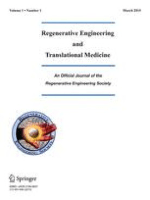
Regenerative Engineering and Translational Medicine
Scope & Guideline
Unveiling New Horizons in Cell Biology and Engineering
Introduction
Aims and Scopes
- Tissue Engineering and Regenerative Medicine:
The journal covers a wide range of topics related to tissue engineering, including the design and application of scaffolds, biomaterials, and cell therapies to promote regeneration in various tissues and organs. - Stem Cell Research and Applications:
A significant portion of the research published focuses on the utilization of stem cells, including mesenchymal stem cells, in regenerative therapies, exploring their differentiation potential and therapeutic applications. - Biomaterials Development:
The journal emphasizes the development of new biomaterials, including hydrogels, nanocomposites, and decellularized matrices, tailored for specific applications in regenerative medicine and tissue engineering. - Advanced Manufacturing Techniques:
Research on additive manufacturing and bioprinting techniques for creating complex tissue structures is a key area of focus, contributing to the innovative approaches in regenerative engineering. - Translational Medicine:
The journal aims to bridge the gap between laboratory research and clinical applications, highlighting studies that demonstrate the efficacy of regenerative therapies in clinical settings.
Trending and Emerging
- 3D Bioprinting and Scaffold Fabrication:
There is a growing emphasis on 3D bioprinting technologies and scaffold fabrication techniques, which are crucial for creating complex tissue structures and enhancing the regenerative capabilities of engineered tissues. - Nanotechnology in Regenerative Medicine:
The integration of nanotechnology into regenerative medicine is gaining traction, with studies focusing on nanomaterials for drug delivery, enhanced healing, and tissue regeneration. - Extracellular Vesicles and Secretome Studies:
Research exploring the therapeutic potential of extracellular vesicles and the secretome of stem cells is on the rise, highlighting their role in mediating regenerative effects and cell communication. - Smart Biomaterials and Responsive Systems:
The development of smart biomaterials that respond to environmental stimuli (e.g., pH, temperature) for controlled drug delivery and tissue regeneration is increasingly being explored. - Applications in Neurological Disorders:
There is growing interest in the application of regenerative engineering principles to neurological disorders, including the use of stem cells and biomaterials for nerve regeneration and repair.
Declining or Waning
- Traditional Biomaterials without Novel Modifications:
There seems to be a decreasing focus on traditional biomaterials that lack innovative modifications or applications, as the field increasingly prioritizes advanced materials with enhanced functionalities. - Basic Stem Cell Biology:
Research primarily focused on the basic biology of stem cells, without direct applications or translational aspects, appears to be less prevalent as the journal shifts towards more applied research. - Non-Engineering Approaches to Regeneration:
Studies that do not integrate engineering principles or innovative technologies into regenerative medicine are becoming less common, indicating a preference for interdisciplinary research that combines engineering with biological sciences.
Similar Journals
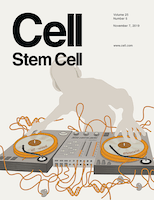
Cell Stem Cell
Elevating Research Standards in Stem Cell and Molecular BiologyCell Stem Cell, published by CELL PRESS, is a premier journal at the forefront of cellular biology, genetics, and molecular medicine. With an esteemed impact factor and recognized as a Q1 journal in multiple categories including Cell Biology, Genetics, and Molecular Medicine, it offers researchers, professionals, and students rigorous, peer-reviewed articles that shape the future of stem cell research and regenerative medicine. Located in Cambridge, MA, this journal has become an invaluable resource since its inception in 2007 and is committed to disseminating groundbreaking findings that drive innovation and understanding in these critical fields. By consistently ranking within the top percentile of its categories in Scopus, Cell Stem Cell remains an essential platform for scholarly communication, fostering collaboration among leading scientists worldwide. Although the journal does not currently offer open access options, its comprehensive insights are pivotal for anyone engaged in the study of stem cells and their applications.
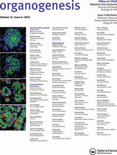
Organogenesis
Innovating Insights into Organ Development.Organogenesis is a leading journal published by Taylor & Francis Inc, dedicated to advancing the field of developmental biology and regenerative medicine. With an ISSN of 1547-6278 and E-ISSN 1555-8592, this journal spans an extensive research scope that includes embryology, transplantation, and biomedical engineering, distinguishing itself as a crucial platform for researchers and practitioners alike. Its impact is reflected in its performance across various categories in 2023, earning Q3 rankings in Biomedical Engineering and Embryology, Q4 in Developmental Biology, and Q2 in Transplantation, showcasing its reputable standing among peer journals. Moreover, with Scopus rankings indicating strong positioning in the fields of medicine and biochemistry, Organogenesis is essential for those looking to publish or stay updated on pioneering research. The journal facilitates rigorous peer-review and offers a forum for disseminating innovative findings, making it an invaluable resource for academics, professionals, and students committed to understanding the complexities of organism development.

Current Stem Cell Research & Therapy
Empowering Discovery in Stem Cell ResearchCurrent Stem Cell Research & Therapy, published by Bentham Science Publishers Ltd, is a leading journal dedicated to advancing the field of stem cell research. With an ISSN of 1574-888X and an E-ISSN of 2212-3946, this journal has been a valuable resource since its inception in 2006 and continues to broaden its scope through 2024. Recognized in the Q2 quartile for Medicine (miscellaneous) and ranked in the 66th percentile among its peers, the journal plays a crucial role in disseminating high-quality, peer-reviewed research that explores both the therapeutic and biological implications of stem cells. Located in the United Arab Emirates, Current Stem Cell Research & Therapy embraces a global audience of researchers, professionals, and students, providing a vibrant platform for discourse and innovation. While the journal offers subscription-based access, it remains committed to enhancing the scientific community's understanding of stem cell therapy and its applications across various medical fields.
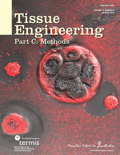
Tissue Engineering Part C-Methods
Elevating the Science of Tissue Engineering with Rigorous ResearchTissue Engineering Part C: Methods is a prestigious academic journal published by MARY ANN LIEBERT, INC, specializing in the dynamic and rapidly evolving fields of bioengineering and biomedical engineering. With an ISSN of 1937-3384 and E-ISSN 1937-3392, this journal provides a platform for the dissemination of cutting-edge research from 2008 to 2024, showcasing methodologies that advance the science of tissue engineering. Ranked in the second and third quartiles across several categories in 2023, including a notable Q2 in Biomedical Engineering, the journal is recognized for its contributions to the interface of biology and engineering. Additionally, it holds commendable Scopus ranks that highlight its influence and reach within the scientific community. Although it does not offer open access, the journal remains vital for researchers, professionals, and students seeking insightful articles that bridge the gap between theoretical research and practical application in tissues and regenerative medicine. With its rigorous peer-review process and commitment to quality, Tissue Engineering Part C: Methods continues to be an essential resource for those at the forefront of tissue engineering innovations.

Cellular and Molecular Bioengineering
Bridging Disciplines for Groundbreaking Scientific DiscoveryCellular and Molecular Bioengineering, published by SPRINGER, is a prominent journal dedicated to the exploration of interdisciplinary approaches in the fields of biochemistry, genetics, and molecular biology. With an ISSN of 1865-5025 and an E-ISSN of 1865-5033, this journal has been a pivotal resource since its inception in 2009, showcasing groundbreaking research that combines innovative modeling and simulation techniques with cellular and molecular applications. As a Q2 journal in both Biochemistry, Genetics and Molecular Biology (miscellaneous) and Modeling and Simulation categories, it ranks favorably in the Scopus metrics, placing 62nd out of 324 in Mathematics_ Modeling and Simulation, and 69th out of 221 in General Biochemistry, Genetics and Molecular Biology. The journal's commitment to quality research and its contribution to advancing academic dialogue make it essential for researchers, professionals, and students seeking to stay at the forefront of bioengineering innovation. While it currently does not offer open access, it continues to provide significant insights and empirical studies that can help shape future developments in the field, reinforcing its role as a key player in cellular and molecular bioengineering.

CELL AND TISSUE BANKING
Connecting research and practice in cell and tissue banking.CELL AND TISSUE BANKING, published by Springer, is a prominent journal dedicated to advancing the fields of biomaterials, biomedical engineering, cell biology, and transplantation. With its ISSN 1389-9333 and E-ISSN 1573-6814, the journal plays a crucial role in disseminating high-quality research from its inception in 2000 to its ongoing contributions through 2024. Situated in the Netherlands, it boasts a respectable 2023 impact factor with notable quartile rankings, positioning it within the Q3 category for biomaterials, biomedical engineering, and transplantation, and Q4 for cell biology. Furthermore, its Scopus rankings underscore its relevance and influence, particularly in the fields of medicine and engineering. Although it does not currently offer open access options, the journal remains a vital resource for researchers, professionals, and students alike, fostering innovation and knowledge transfer in the critical areas of cell and tissue sustainability.
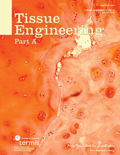
Tissue Engineering Part A
Bridging Research and Clinical ExcellenceTissue Engineering Part A is a prestigious peer-reviewed journal published by MARY ANN LIEBERT, INC that focuses on innovative research and advancements within the field of tissue engineering and regenerative medicine. Since its inception in 2008, this journal has played a critical role in disseminating cutting-edge findings that bridge the gap between laboratory research and clinical application, underscoring its significance in the scientific community. With a diverse scope encompassing biochemistry, bioengineering, biomaterials, and biomedical engineering, the journal ranks notably in the Scopus database, holding a Q2 quartile status across multiple categories, thus reflecting its high impact on ongoing research and professional practice. For researchers, professionals, and students, Tissue Engineering Part A serves as an invaluable resource, offering insights into the latest methodologies and breakthroughs that drive the future of healthcare and therapeutic strategies. While primarily a subscription-based journal, it ensures that vital research is accessible to a broad audience of scientists and engineers committed to advancing the life sciences.

ARTIFICIAL ORGANS
Connecting Ideas and Innovations in Bioengineering.ARTIFICIAL ORGANS is a leading academic journal published by Wiley, focusing on the interdisciplinary fields of bioengineering, biomaterials, and biomedical engineering. Established in 1977 and continuing through 2024, this journal plays a pivotal role in advancing research related to artificial organs and their impact on healthcare innovations. With an impressive impact factor and notable Q2 rankings across multiple categories, including Medicine and Biomedical Engineering, ARTIFICIAL ORGANS caters to a global audience of researchers, professionals, and students devoted to the latest developments in organ replacement and regenerative medicine. Although not an open-access journal, it maintains a rich repository of essential research articles, reviews, and case studies that collectively enhance the scientific community's understanding of artificial organ technologies. By publishing high-quality, peer-reviewed content, ARTIFICIAL ORGANS remains a vital source for emerging knowledge and collaborations in the exciting field of artificial organ research.
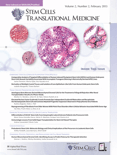
Stem Cells Translational Medicine
Pioneering Innovations in Stem Cell ResearchStem Cells Translational Medicine, published by Oxford University Press, is a leading open-access journal that has been at the forefront of stem cell research since its launch in 2012. With an impressive impact across various categories, it occupies Q2 in Cell Biology and is highly recognized in Q1 for both Developmental Biology and Miscellaneous Medicine in 2023. Its strong Scopus rankings highlight its significance in the fields of Biochemistry, Genetics, and Molecular Biology, achieving an outstanding percentile ranking of 93rd in Developmental Biology. The journal provides a pivotal platform for researchers, professionals, and students to publish and access cutting-edge findings that contribute to the understanding and application of stem cell technology. With a commitment to disseminating high-quality scientific knowledge, Stem Cells Translational Medicine plays a vital role in advancing research and innovation within the rapidly evolving landscape of regenerative medicine.

Journal of Stem Cells & Regenerative Medicine
Bridging Research and Clinical PracticeThe Journal of Stem Cells & Regenerative Medicine is a leading publication dedicated to the advancing field of stem cell research and regenerative medicine. Established in India and published by JOURNAL STEM CELLS & REGENERATIVE MEDICINE, this Open Access journal has been available since 2007, providing researchers and practitioners with free and unrestricted access to high-quality articles. With an ISSN of 0973-7154, the journal is indexed in Scopus, featuring a wide array of topics and insights into biochemistry, biotechnology, cell biology, and molecular biology, as denoted by its relevant quartile rankings. This journal is committed to bridging the gap between laboratory research and clinical applications, making significant contributions to the scientific community. The convergence of innovative studies from 2010 to 2024 positions it as an invaluable resource for those looking to stay at the forefront of stem cell and regenerative medicine research.